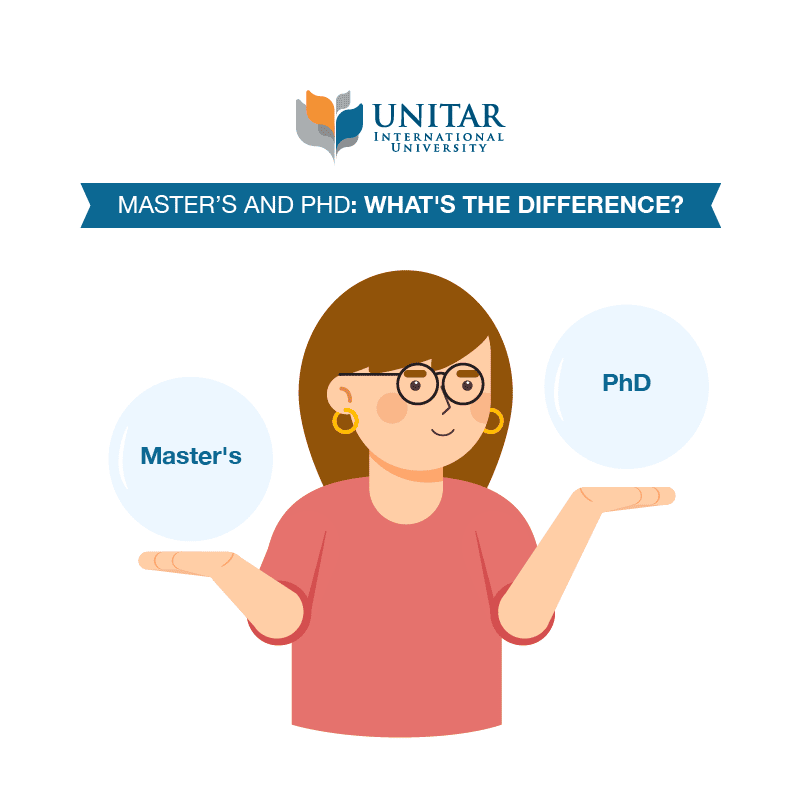Master’s and PhD: What’s the Difference?
- Date:
- Author: UNITAR International

If you’re reading this, you’ve probably recently graduated, to which we say, congratulations! Now you’re browsing through postgraduate programmes like Masters and PhD and you’re unsure of what to choose — say no more! Here is a complete guide to navigating through the difference between a PhD and a Master’s degree.
A Master’s degree is typically a more detailed extension of the undergraduate journey if you’re looking to refurbish your professional skills for a career and aren’t committed to working just yet. It can come in different modes — coursework, fully research, or mixed. A master’s degree is a great stepping stone that will open doors to a multitude of careers (as well as getting a better starting salary too!) and the best part is that it can be completed within 1-2 years.
A PhD (Doctor of Philosophy) is a research degree that is designed for students who are interested in discovering new knowledge based on scientific research and/or gaining teaching experience. This postgraduate degree falls under the doctorate category. Neither PhDs nor doctorates are “better” than the other.
Now that we know what a master’s degree and a PhD is… what’s the difference? They’re both postgraduate degrees, so which one should you enrol for?
The first difference between a master’s and a PhD is the admission process — a master’s is somewhat similar to that of an undergraduate programme; you would need to meet the requirements of the course and prepare the required documents before submitting the application. It is important to note that there are not many financial aids available for a master’s programme, though this can vary from one institution to another. As for a PhD, it is unsurprising that it is not as easy as getting into a master’s programme. Naturally, as the highest level of tertiary education, it is more competitive to get into. Oftentimes, you may have to present a proposal or possess a master’s degree first before getting accepted. Be sure to look into the requirements carefully!
The next difference between a master’s and a PhD degree programme is the pre-requisites and study eligibility. While certain PhDs may not require a master’s degree in the respective field beforehand, a master’s degree absolutely requires the completion of a bachelor’s degree. You don’t actually need to get into Dean’s list to apply for both master’s and PhD programmes, but there is typically a baseline as low as 3.0 CGPA. A PhD, however, requires relevant research experience, which can also include working experience in a related field. Applicants that don’t do a master’s first can try a fast-track route in Malaysia if they graduate with first-class honours in their undergraduate degree. It is also important to note that there may be some PhD programmes that need specific exams to study for, like the GRE and GMAT, particularly if you’re transitioning from a different field of discipline.
As mentioned previously, a PhD focuses on specialisation and so this would instantly have you recognised as a kind of expert in your field, as you would have spent a more comprehensive amount of time compared to a master’s degree. Nonetheless, having a master’s degree will put a good foot forward for you in the working world, as you would have finished earlier and can obtain in advance the relevant experience. Let’s not forget that when you are working with like-minded individuals from all walks of life in a master’s programme, you are entering a great opportunity to network, compared to the solidarity that comes from being a PhD student. If you’re someone who loves research, however, and would like to enter academia, a PhD is undoubtedly a boon to your career in the relevant discipline.
Knowing the difference between a PhD and a master’s programme is essential to fulfilling respective academic and/or career goals. Explore our affordable postgraduate programmes including Master of Early Childhood Education – Online and Doctor in Business Administration (DBA) – Online today.
Our education counsellors are ready to help you!
Complete the form below;
it takes less than a minute.
WhatsApp us